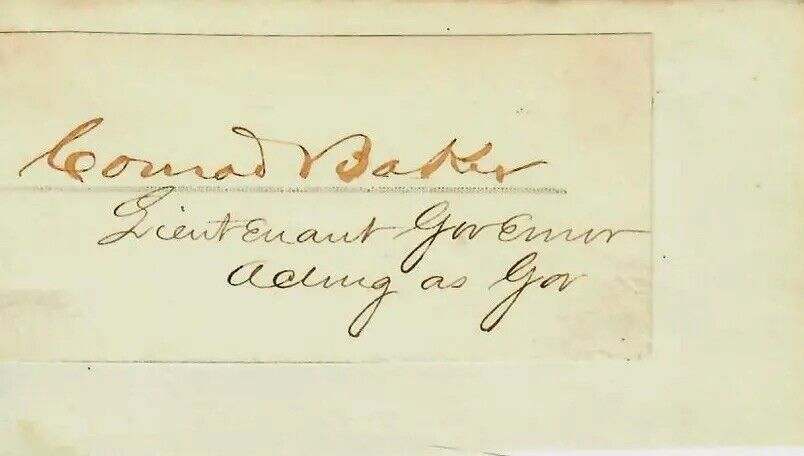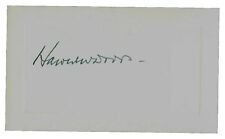When you click on links to various merchants on this site and make a purchase, this can result in this site earning a commission. Affiliate programs and affiliations include, but are not limited to, the eBay Partner Network.
Up for sale a RARE!"15th Indiana Governor" Conrad Baker Clipped Signature.
ES-4839
Conrad Baker(February12, 1817 – April 28, 1885) was a state representative,15th Lieutenant Governor,and the15thGovernorof theU.S.state ofIndianafrom 1867 to 1873. Baker had served in theUnion Armyduring theAmerican Civil War, risingto the rank of colonel but resigned following his election as lieutenantgovernor, during which time he played an important role in overseeing theformation and training of states levies. He served as acting-governor for fivemonths during the illness of GovernorOliver Morton, and was elevated to Governor following Morton'sresignation from office. During Baker's full term as governor, he focusedprimitively on the creation and improvement of institutions to help veteransand their families that had been disaffected by the war. He also championed thepost-war federal constitutional amendments, and was able to successfullyadvocate their acceptance. Conrad Baker was born inFranklin County,Pennsylvania, on February 12, 1817, the son of Conrad Baker, aPresbyterianminister, and Mary Winternheimer Baker. Heworked on the family farm until age fifteen and attended common school. He thenenrolled inPennsylvania CollegeinGettysburgwhere hestudied law, but quit before graduating. He continued to study law in theoffice ofThaddeus Stevens. He metMatilda Escon Sommers and the couple married in 1838. They had two children.Baker was admitted to the bar in 1839 and opened his own office in Gettysburg. Bakersclosed his practice in 1841, and moved his family west to settle inEvansville, Indiana. Heopened a new law office there, and took an interest in the city's civics. In1845 he ran as the Whig candidate for representative of Vanderburgh County intheIndiana House ofRepresentatives. He served one one-year term before returning to hispractice. He was elected to serve on a county court in 1852 but resigned in1854. His brother, William Baker, had also become active in the local politics,and served four terms as major of Evansville during the same time period. Bakerwas outspokenly anti-slavery, and following the break-up of the Whig party, hejoined the newly formed Republican Party in 1854. At the state convention in1856, he was nominated to run as lieutenant governor on the ticket withOliver Mortona governor. The election was one of themost divisive in state history, with both sides making scathing attacks on theother. Despite the party's merger with several other third parties, theRepublicans lost the election and Baker returned to his law practice inEvansville. Baker'swife, Matilda died in 1855, and Baker remarried in 1858 to Charlotte FrancesChute. The couple had two daughters and one son. He was in Evansville whentheAmerican Civil Warbegan,and was part of a large crowd that gathered to discuss the event. He took thepodium and delivered a speech calling on the crowd to take an oath ofallegiance to the Union, which was administered by his brother, the Mayor. Hethen called on all the able-bodied men to follow him to war. Baker and hisbrother began actively recruiting a full regiment of men to serve in the war,and he was promoted to serve as Colonel of the1st Regiment Indiana Cavalry. Bakerled his regiment in defensive and garrison duty across the western theater ofthe war, and remained in regular communication with GovernorOliver Morton, who has become governor a few months earlier.Baker was most involved in coordinating supplies, and became a valuableorganizer. Morton soon promoted him to serve as provost marshal of the state,and ordered him to return toIndianapolisto oversee operations. There he oversaw theformation of dozens of state regiments, tens of thousand of men, the shipmentof tons of supplies, the distributions of weapons, and the management of thestate arsenal. Bakerleft the army in 1864 to run again as Lieutenant Governor on the ticketwithOliver Mortonand waselected with a 20,000-vote majority. Morton took a period of poor health in1865 after suffering a paralytic stroke. He continued his duties briefly, butdecided to attempt to seek a cure to the paralysis. He left the state and leftBaker to serve as acting governor for five months until his health recovered.When Morton was elected to the Senate in 1866, Baker succeeded him as governor.While completing Morton's term, he began to advocate school reform. His primarygoal was to improve the quality of teachers, which he sought to do by creatingincentives to encourage teachers to consider their job as a permanent career.At that time, teaching was considered a temporary position by most teachers, untilthey could find a superior job elsewhere. The General Assembly accepted hisplan and passed legislation to enact it.




































